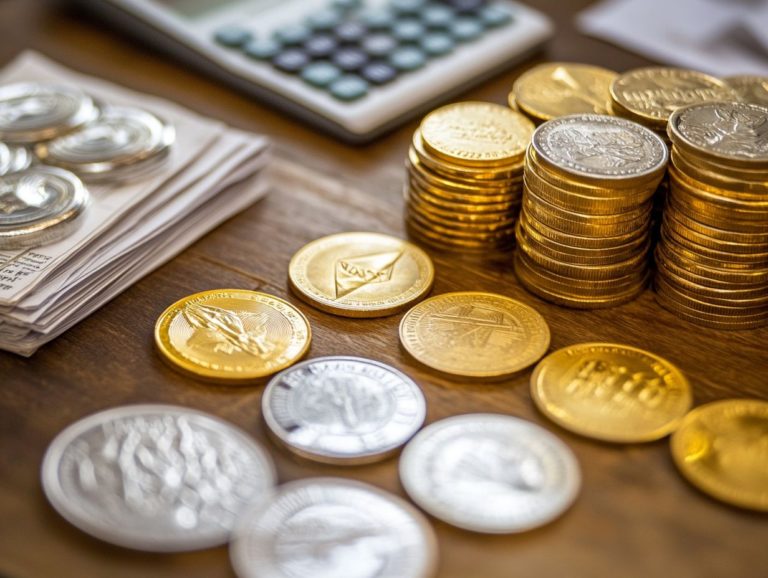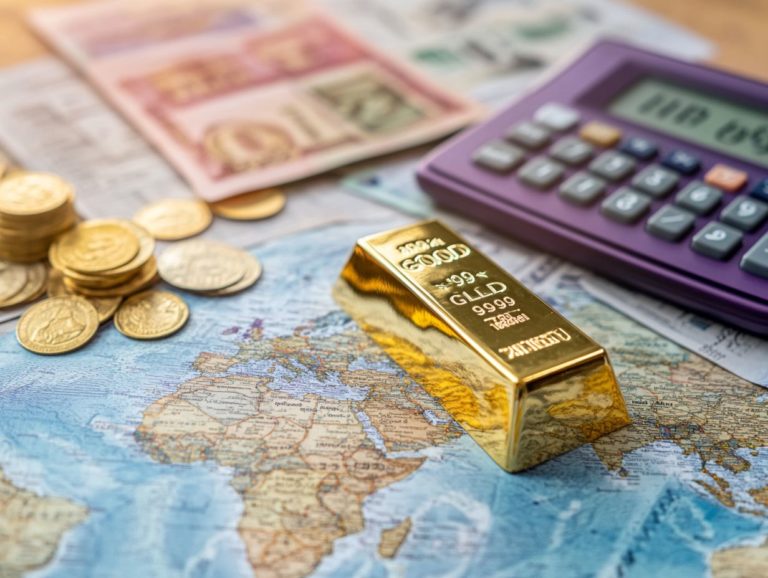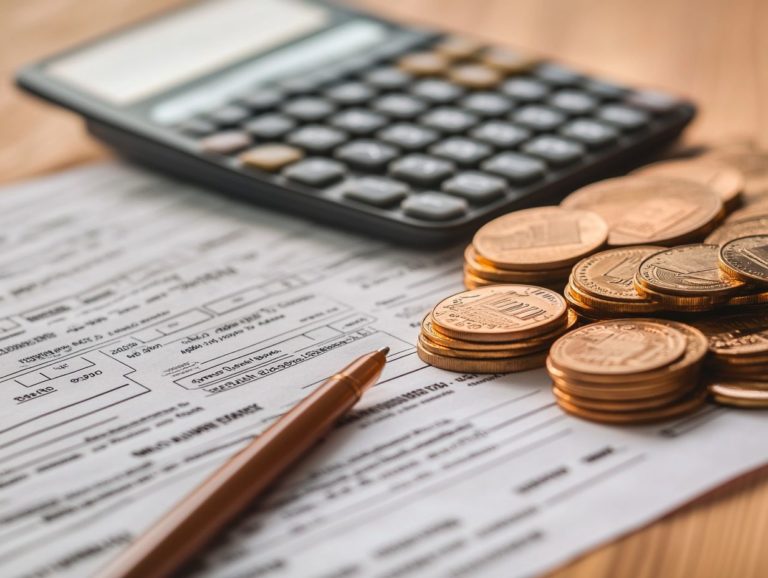Tax Strategies for Precious Metals in Emerging Markets
Investing in precious metals can be a rewarding yet intricate endeavor. It becomes particularly complex when navigating the tax landscape in diverse emerging markets.
In this article, we explore key tax considerations surrounding the buying, selling, and holding of precious metals. You’ll discover implications for tax-advantaged accounts and effective strategies to minimize your tax burdens.
We also address the unique tax challenges that precious metal mining companies encounter, offering insights into tax laws across various countries.
Whether you’re a seasoned investor or just embarking on your investment journey, grasping these factors can significantly elevate your investment strategy.
Contents
- Key Takeaways:
- Overview of Precious Metals and Emerging Markets
- Tax Considerations for Investing in Precious Metals
- Strategies for Minimizing Taxes on Precious Metals
- Tax Planning for Precious Metal Mining Companies
- Navigating Tax Laws in Different Emerging Markets
- Frequently Asked Questions
- What are tax strategies for investing in precious metals in emerging markets?
- Are there any tax incentives for investing in precious metals in emerging markets?
- How can diversifying my precious metals investments help with taxes in emerging markets?
- Do I need to pay taxes on my precious metals investments in emerging markets?
- Can I use tax-loss harvesting for my precious metals investments in emerging markets?
- What should I consider when choosing a tax advisor for my precious metals investments in emerging markets?
Key Takeaways:
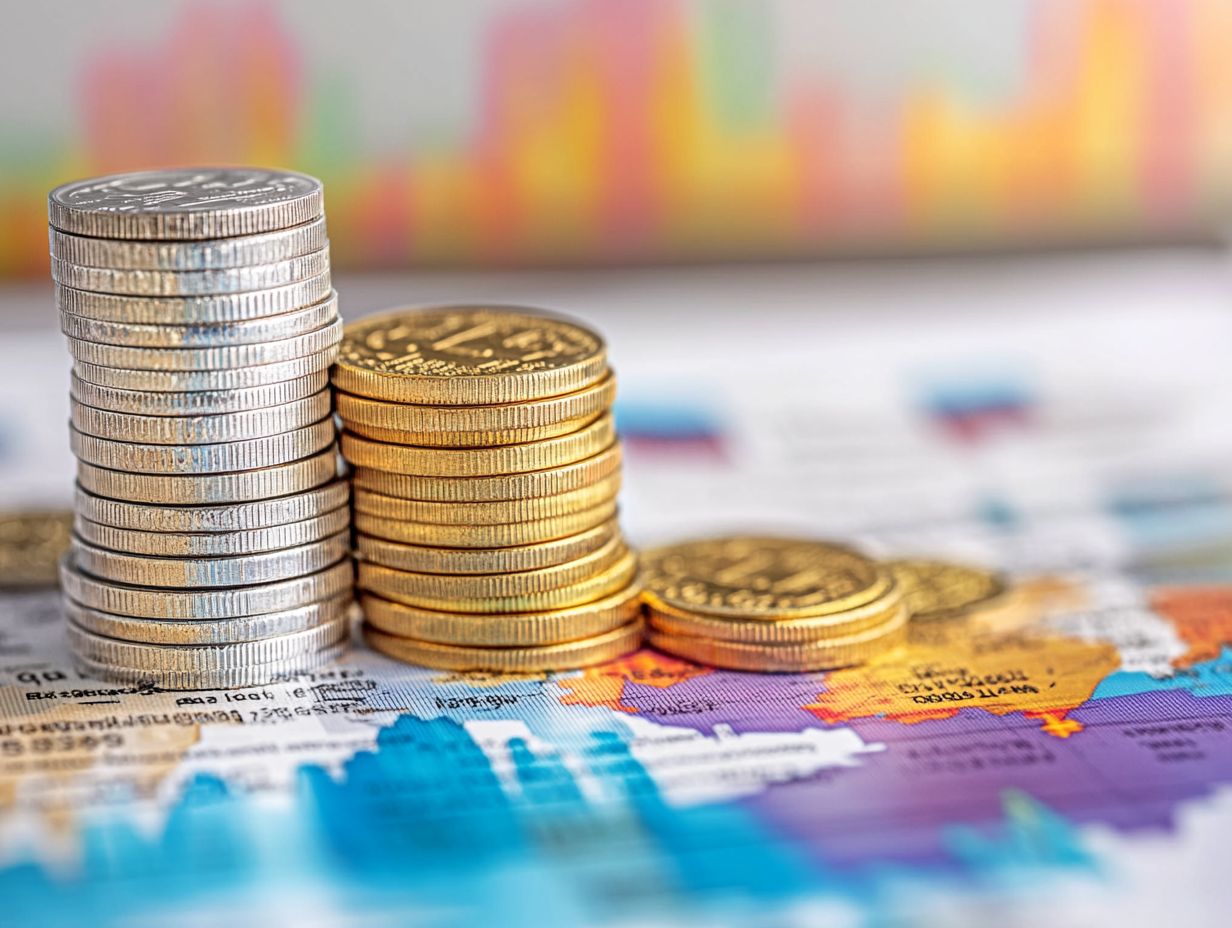
- Understand the tax implications of investing in precious metals; they vary by country and can impact your returns.
- Timing purchases and sales strategically while utilizing tax deductions and credits can help minimize tax burdens on precious metals investments.
- Precious metal mining companies should plan for taxes on both domestic and international operations to maximize profits and comply with local tax laws.
Overview of Precious Metals and Emerging Markets
Investing in precious metals like gold, silver, and platinum has emerged as a pivotal strategy in today s financial landscape, particularly within the realm of emerging markets. As global economic uncertainty looms, these physical metals serve as valuable means of diversification and a robust hedge against inflation.
The World Gold Council underscores the significance of incorporating precious metals into your investment portfolio. This is especially true when faced with the volatility of traditional markets. By considering these tangible assets, you position yourself for potential long-term gains amidst an unpredictable economic climate.
Tax Considerations for Investing in Precious Metals
When you invest in precious metals, grasping the tax considerations is essential. This includes understanding the effects of profit from selling an investment and the tax implications outlined by the Internal Revenue Service (IRS).
You will need to navigate a range of tax liabilities, including reporting requirements and tax-efficient strategies. These factors can significantly impact your overall financial growth and investment returns, making it imperative to approach them with diligence.
Tax Implications of Buying and Selling Precious Metals
The tax implications of buying and selling precious metals can differ significantly. This depends on whether your gains are classified as short-term or long-term. Each classification is subject to varying capital gains tax rates. Therefore, understanding how these distinctions impact your overall tax liability is essential, along with the reporting requirements for taxable distributions.
Short-term capital gains arise from assets held for a year or less and are typically taxed at your ordinary income tax rate, leading to a heavier tax burden. Conversely, long-term capital gains applicable to assets held for more than a year often enjoy reduced rates, making them a more appealing option for wealth accumulation.
As an investor in precious metals, you also need to navigate specific reporting guidelines. These guidelines require you to detail any sales and gains on your tax returns, significantly influencing your overall financial strategy. Therefore, staying informed about these distinctions is crucial for tax strategies for maximizing returns in precious metals and effective investment planning.
Tax-Advantaged Accounts for Precious Metals
Utilizing tax-advantaged accounts, like a precious metals IRA, opens up a world of possibilities for you. These accounts not only allow for tax deferral but also offer the potential for tax-free withdrawals, making them an appealing choice for long-term investing. You can hold physical metals within these accounts, providing a strategic layer of asset protection while remaining compliant with IRS regulations.
Beyond the financial perks, a precious metals IRA grants you a buffer against market volatility. By building wealth over time, it enables tax-deferred growth that can enhance your portfolio’s overall performance.
Using trusts and limited liability companies (LLCs) can improve your tax strategy, allowing for more sophisticated asset management and protection.
By adopting these methods, you can safeguard your precious metals and gain significant advantages, such as reducing capital gains taxes. Understanding the tax consequences of trading precious metals can be your game-changer for a secure financial future!
Strategies for Minimizing Taxes on Precious Metals

Minimizing taxes on your precious metals investments calls for effective, tax-efficient strategies think of tax loss harvesting, which is selling an investment at a loss to reduce your taxable income, and the artful timing of purchases and sales. By mastering tax implications, you can strategically navigate this landscape to optimize your after-tax returns and diminish your overall tax liability.
Timing Purchases and Sales
The timing of your purchases and sales in precious metals investing can significantly impact your tax outcomes, especially when it comes to the holding period that determines whether your gains are classified as short-term or long-term. Understanding the tax rates associated with each classification is crucial for strategizing your investment decisions.
For example, if you hold your precious metals for more than a year before selling, your gains may be taxed at the more favorable long-term capital gains rate, which is typically lower than the short-term rate applied to assets held for less than a year.
Imagine this: you buy gold bullion and, six months later, witness a substantial price increase. If you sell too soon, you might face a higher tax liability, which could eat into your overall profit. Conversely, waiting until that one-year mark could enhance your tax efficiency, highlighting the importance of understanding tax strategies for investing in precious metals ETFs, showcasing just how vital timing is to optimizing your returns on precious metals investments.
Utilizing Tax Deductions and Credits
You can greatly enhance your overall tax-efficient strategies by utilizing tax deductions and credits when investing in precious metals. Knowing what qualifies for deductions can help offset some of the investment risks associated with market volatility.
For instance, the Internal Revenue Service (IRS) allows certain expenses related to the storage and maintenance of precious metals to be deductible, which can directly reduce your overall costs. Tax credits might also apply to specific transactions, such as capital gains tax exemptions for long-term holdings. To maximize these benefits, consider exploring tax strategies for precious metals in today’s market to significantly increase your returns!
It’s wise to keep meticulous records of all purchases and expenses. Doing so ensures that you can effectively leverage these tax benefits, leading to a more robust and resilient investment strategy.
Tax Planning for Precious Metal Mining Companies
Effective tax planning is vital for precious metal mining companies, considering the intricate tax strategies that need to align seamlessly with mining operations while adhering to local and federal regulations.
Grasping the ever-changing tax landscape is essential to ensure operational efficiency and foster financial growth.
Start planning your taxes today to maximize your investment potential!
Tax Strategies for Mining Operations
Mining operations must implement specific tax strategies to expertly navigate compliance and adhere to reporting requirements. This ensures that your financial activities align with industry best practices. These strategies can significantly impact your operational bottom line.
To achieve this, consider various deductions associated with exploration costs, equipment depreciation, and environmental compliance expenses. Tax credits aimed at sustainability initiatives can also yield substantial savings. It’s essential for anyone in the mining sector to maintain careful records and reports to avoid hefty penalties from non-compliance.
By integrating a robust tax planning approach, you not only meet regulatory obligations but also enhance your overall financial health. This allows for better investment in future projects and innovation.
Tax Planning for International Mining Activities
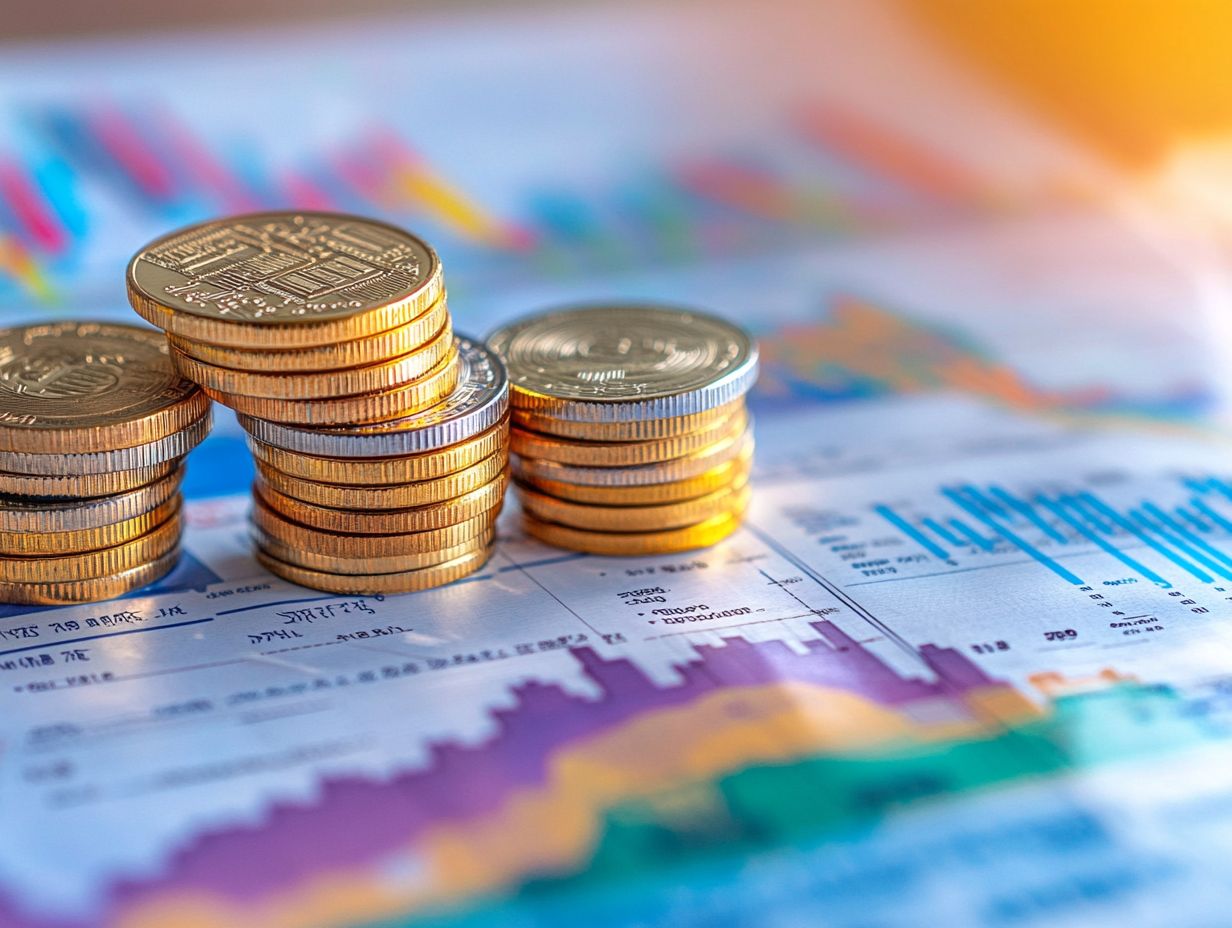
Tax planning for your international mining activities requires deft navigation through a complex maze of tax regulations and compliance requirements across various jurisdictions. Staying informed about international legislation is essential to prevent costly tax liabilities and bolster your operational success.
By understanding these diverse tax frameworks, you can strategically structure your operations to optimize tax benefits while minimizing risks. Different countries offer unique incentives and varying tax rates for resource extraction, making it imperative to evaluate the implications of local regulations alongside international agreements.
You may encounter challenges in ensuring compliance. Overlooking these challenges could lead to potential penalties or damage your reputation. That’s why developing a robust tax strategy is vital not only for your financial well-being but also for promoting sustainable practices that align with each jurisdiction’s environmental and social governance standards.
Navigating tax laws in various emerging markets presents distinctive challenges for you as an investor. This is especially true when it comes to compliance with the IRS and understanding the specific regulations that govern investments in these regions.
Being well-informed about local tax laws can significantly reduce your investment risks and improve your financial outcomes.
Understanding Tax Laws in Specific Countries
Understanding the intricacies of tax laws in specific countries is essential for you as an investor aiming to seize opportunities in emerging markets. These regulations can differ significantly and directly impact your compliance. Each market offers unique investment strategies tailored to align with local legislation.
Take Canada, for example, where a Goods and Services Tax (GST) is applied to precious metals purchases. In contrast, Germany allows for certain value-added tax (VAT) exemptions under specific conditions. Additionally, understanding the role of precious metals in tax-deferred accounts is crucial, as some countries, like the United States, impose stringent reporting requirements for transactions that exceed certain thresholds.
To make your investments soar, it’s vital to adopt a comprehensive compliance strategy. This may include:
- Consulting with local tax professionals
- Understanding applicable tax treaties
- Stay updated on changes that affect your investments
Frequently Asked Questions
What are tax strategies for investing in precious metals in emerging markets?
Some tax strategies for investing in precious metals in emerging markets include taking advantage of tax incentives and exemptions, diversifying your investments to spread out tax burdens, and consulting with a tax advisor familiar with the specific market’s tax laws.
Are there any tax incentives for investing in precious metals in emerging markets?

Yes, some emerging markets offer tax incentives for investing in precious metals. These can include lower capital gains tax rates or deductions for certain investment expenses.
How can diversifying my precious metals investments help with taxes in emerging markets?
Diversifying your investments helps spread out tax burdens. It also reduces the risks tied to investing in a single emerging market.
Do I need to pay taxes on my precious metals investments in emerging markets?
Taxes on precious metals investments vary by market and your tax residency. Don’t miss out consult a tax advisor to clarify your tax responsibilities!
Can I use tax-loss harvesting for my precious metals investments in emerging markets?
Tax-loss harvesting means selling investments that have lost value to reduce your tax bill. This strategy may work in some emerging markets, but understand the tax laws first.
What should I consider when choosing a tax advisor for my precious metals investments in emerging markets?
Choose a tax advisor who knows the specific tax laws of the market you re investing in. Ensure they are licensed and experienced with precious metals investments.










